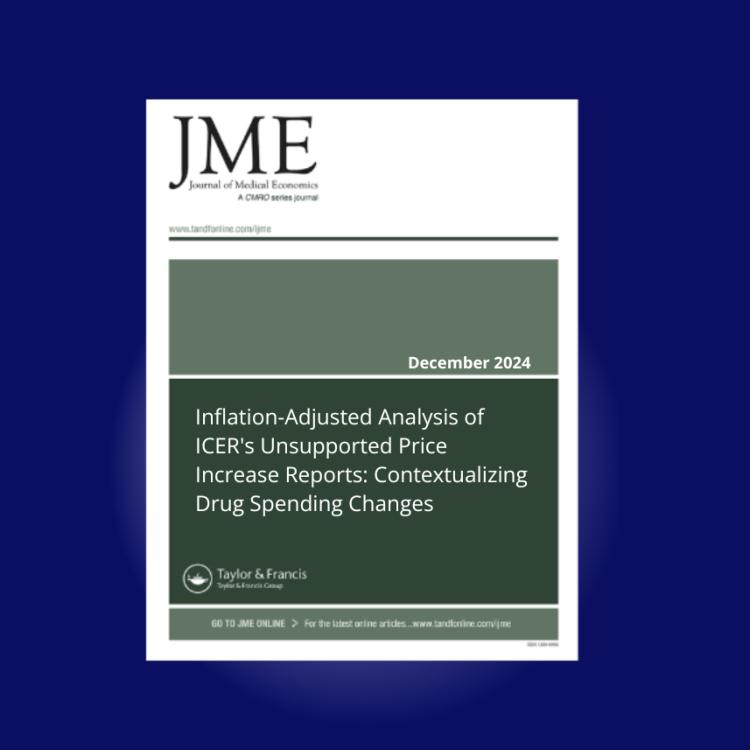For Immediate Release: December 4, 2024
Contact: Michael Pratt, 202-827-2088, [email protected]
Washington, D.C. – A new study published in the Journal of Medical Economics evaluated the economic context of “unsupported” drug price increases reported by the Institute for Clinical and Economic Research (ICER) each of the last four years, confirming that ICER’s lack of inflation adjustments in its assessments resulted in misleading estimates of real changes in healthcare spending across all drugs analyzed. The study, “Inflation-Adjusted Analysis of ICER's Unsupported Price Increase Reports: Contextualizing Drug Spending Changes,” was authored by Tyer D. Wagner, PharmD, PhD; Kimberly D. Westrich, MA; Robert J. Nordyke, PhD; and Jon D. Campbell, PhD.
Since 2019, ICER has published an Unsupported Price Increase (UPI) report on prescription drugs that ICER says aims to "determine whether certain price increases are justified by new clinical evidence or other factors.” These reports, as well as accompanying press releases and media headlines, emphasize the total annual increase in "unsupported" drug spending due to estimates of net price changes and spotlight selected drugs with the highest spending as determined by ICER’s UPI protocol. Critically, these reports do not follow best practice guidelines that recommend adjusting for inflation in analyses of year-over-year price changes.
This is one critique among many that NPC has offered about ICER’s UPI methods in past years. The UPI methods are misaligned with ICER’s core value assessment framework methodology, are based on an arbitrary and insufficient timeframe, use unreliable pricing data, reject the vast majority of evidence, deprioritize patients with rare disease, and are based on old data.
NPC has called on ICER to end the report given its potential to harm patients and society. If ICER continues producing UPI reports, NPC urges the incorporation of its critiques that include year-over-year inflation adjustment to more accurately inform an evidence-based discourse.
The new study analyzes data on drugs classified as having “unsupported” price increases from the four most recent UPI reports spanning pricing data from 2018-2022. NPC researchers then applied inflation adjustments using the Medical Consumer Price Index (Medical CPI) and the Consumer Price Index for All Urban Consumers (CPI-U) to the unadjusted UPI findings.
The inflation-adjusted analysis of ICER's UPI reports revealed notable differences between adjusted and unadjusted estimates of drug spending changes:
- Across ICER's last four UPI reports, when accounting for inflation using Medical CPI and CPI-U measures, the reported increases in drug spending were reduced by an average of 53% and 80%, respectively.
- In the most recent report year of 2023, ICER's unadjusted estimate of a $1.3 billion increase in healthcare spending transformed to a $134 million decrease when adjusted by Medical CPI and a $1.51 billion decrease when adjusted by CPI-U. Therefore, after inflation adjustment, “unsupported price increases” are no longer increases.
- All ten drugs analyzed for the 2023 report showed a decrease in drug spending due to net price change when accounting for inflation. The difference between not adjusting for inflation and adjusting for inflation resulted in a median drug-level decrease of $91.5 million (Medical CPI adjustment) and $180.5 million (CPI-U adjustment).
“When evaluating drug spending trends over time, inflation adjustment is essential," said Tyler Wagner, NPC Associate Director of Research. "Using unadjusted figures can lead to misguided policies that may limit patient access, burden provider clinical decision-making, and fail to place spending changes in relation to broader economic trends.”
The study underscores how the use of unadjusted estimates in policy decisions could have far-reaching implications for several healthcare stakeholders.
- Patients could face unnecessary medication access challenges and increased financial burdens if misinterpretation of unadjusted drug price increases leads to ill-informed formulary restrictions or increased cost-sharing.
- Providers may face additional administrative burden navigating coverage restrictions based on potentially misleading price increase data.
- For manufacturers, unadjusted estimates can create unwarranted negative publicity when drug spending changes due to net price increases are actually below medical or general inflation rates — potentially affecting public perception and both state-level and federal policy responses.
“The consistent pattern of lower inflation-adjusted estimates suggests that the economic impact of UPI year-over-year drug price estimates is likely to be taken out of context and risks being misinterpreted. Until ICER either terminates the UPI reports or makes major changes to its protocol, policymakers should pause before making policy-related decisions based on the report,” said Jon Campbell, NPC Chief Science Officer.
Read the Research:
“Inflation-Adjusted Analysis of ICER's Unsupported Price Increase Reports: Contextualizing Drug Spending Changes” | Journal of Medical Economics
More from NPC:
- Value in Health: "Will the Institute for Clinical and Economic Review’s Shared Savings Approach Decrease Value-Based Prices Most for the Most Severe Diseases?"
About the National Pharmaceutical Council
The National Pharmaceutical Council (NPC) is a health policy research organization dedicated to the advancement of good evidence and science, and to fostering an environment in the United States that supports medical innovation. Founded in 1953 and supported by the nation's major research-based pharmaceutical companies, NPC focuses on research development, information dissemination and education on the critical issues of evidence, innovation, and the value of medicines for patients. For more information, visit www.npcnow.org and follow NPC on LinkedIn.
